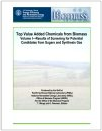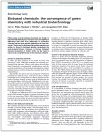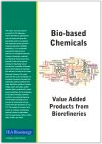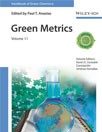What They Are:
Chemists and engineers measure, track and assess performance in a given area, such as sustainability, using metrics.
How They Relate to Green Chemistry:
Comprehensive assessment of a process or product’s sustainability (sometimes called “greenness”) requires quantifying environmental and human health impacts. This means going beyond calculating yield alone. It’s also essential to compare the hazards of chemicals and processes currently in use with potentially safer alternatives.
To do this, scientists must ask the right questions, find the right metrics, start early and measure at key stages. There is a large body of work on metrics that help assess the progress of green and sustainable chemistries. The research in this area is growing and continually being improved upon to facilitate green chemistry development and implementation.
-
- Atom Economy - Synthetic methods should be designed to maximize the incorporation of all materials used in the process into the final product
- Real-time analysis for Pollution Prevention - Analytical methodologies need to be further developed to allow for real-time, in-process monitoring and control prior to the formation of hazardous substances
- Maximize Resource Efficiency –using metrics to measure byproducts, energy use and mass balances helps minimize waste and ensure processes are efficient
-
Molar Efficiency
The University of Strathclyde and GlaxoSmithKline collaborated to develop Molar Efficiency: a metric designed “to facilitate identification of more sustainable synthetic transformations.” Intended specifically for use in discovery-phase medicinal chemistry, the metric can help researchers identify sustainability concerns early in drug development. Molar Efficiency uniquely allows for comparisons of efficiency between different classes of reactions through quantification of moles of inputs and outputs.
Process Mass Intensity (PMI)
The ACS GCI Pharmaceutical Roundtable considers PMI the key green metric for pharmaceuticals. PMI is determined by how much of the total mass of materials used – such as reagents and solvents – ends up in the final product. This approach facilitates a focus designing a reaction with minimal inputs rather than dealing with unwanted outputs after the fact.
Atom Economy
Professor Barry Trost developed the concept of atom economy: chemical reactions that do not waste atoms. Atom economy encourages reducing the use of nonrenewable resources, minimizing the amount of waste, and reducing the number of steps used to synthesize chemicals. While this concept has spread awareness about the need to be cognizant of waste produced by chemical reactions, it’s essential to consider atom economy in tandem with others for a complete picture of sustainability.
-
Process Mass Intensity Calculator and Convergent Process Mass Intensity Calculator
Green Chemistry Innovation Scorecard Calculator
Measures of Green Chemistry Performance (Webinar, 2012)
SC Johnson and the Greenlist Challenge (Case Study, 2009)
Lessons learned through measuring green chemistry performance—the pharmaceutical experience (Presentation, 2007)
DOZN – A Quantitative Green Chemistry Evaluator (The Nexus, 2017)
-

Green Chemistry Metrics—Measuring and Monitoring Sustainable Processes (2008)
This book, aimed at researchers and practitioners in all sectors, outlines key developments in concepts and technologies, providing a foundation and means for green chemistry metrics.
Lessons Learned Through Measuring Green Chemistry Performance – the Pharmaceutical Experience (2007) Lessons learned from the ACS GCI Pharmaceutical Roundtable on using “process mass intensity” as a common metric for assessing reactions.

Unification of Reaction Metrics for Green Chemistry: Applications to Reaction Analysis (2005)
This paper proposes general algorithms for metrics that can compare scenarios for greening synthetic routes.
Metrics to 'green' chemistry—which are best? (2002)
This paper is a guide of commonly used green chemistry metrics, as well as economic analyses of four processes to elucidate relationship between metrics and cost drivers.
Green Metrics, Volume 11
Paul T. Anastas (Series Editor), David J. C. Constable (Volume Editor), Concepcion Jimenez Gonzales (Volume Editor)


